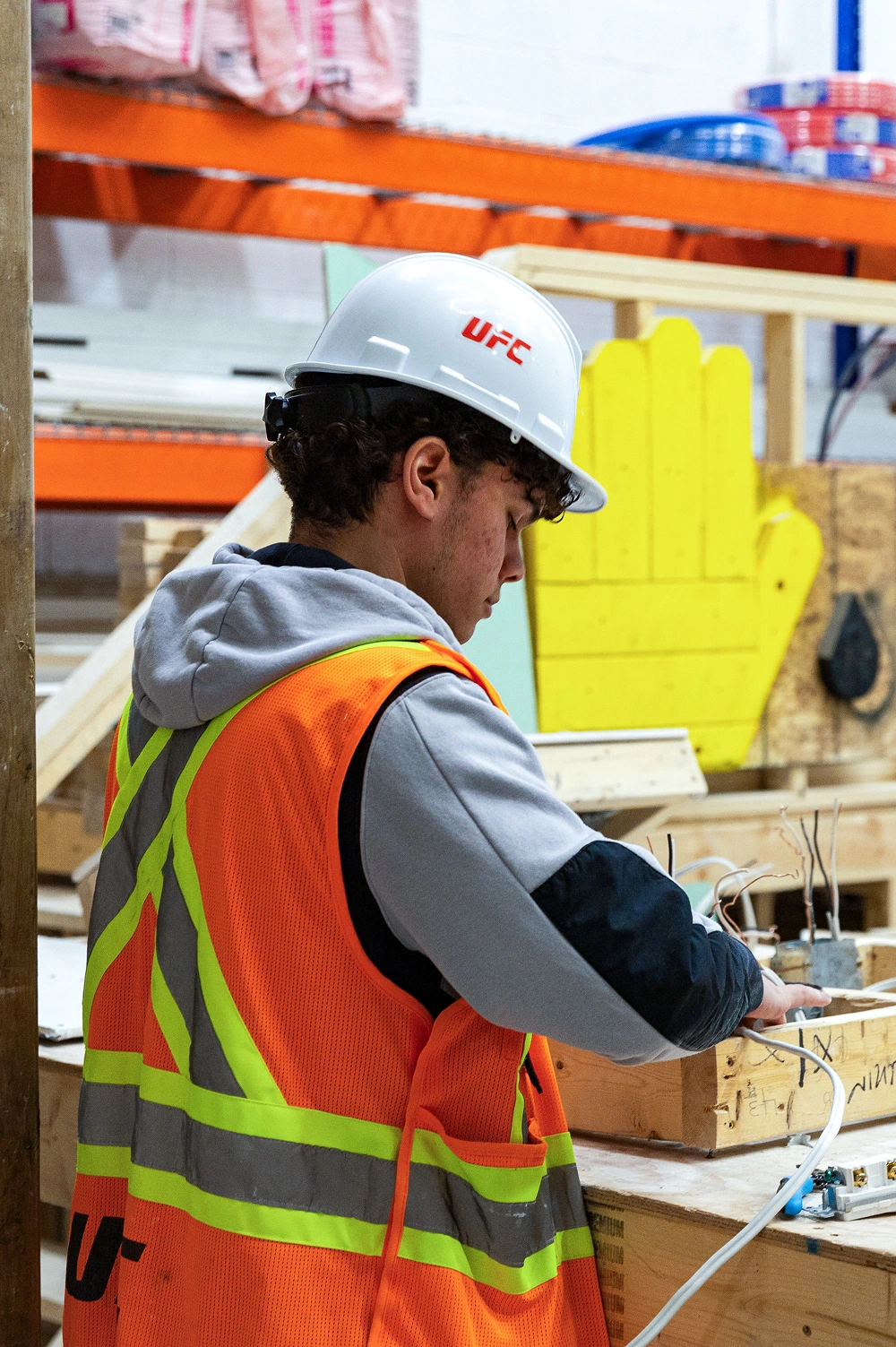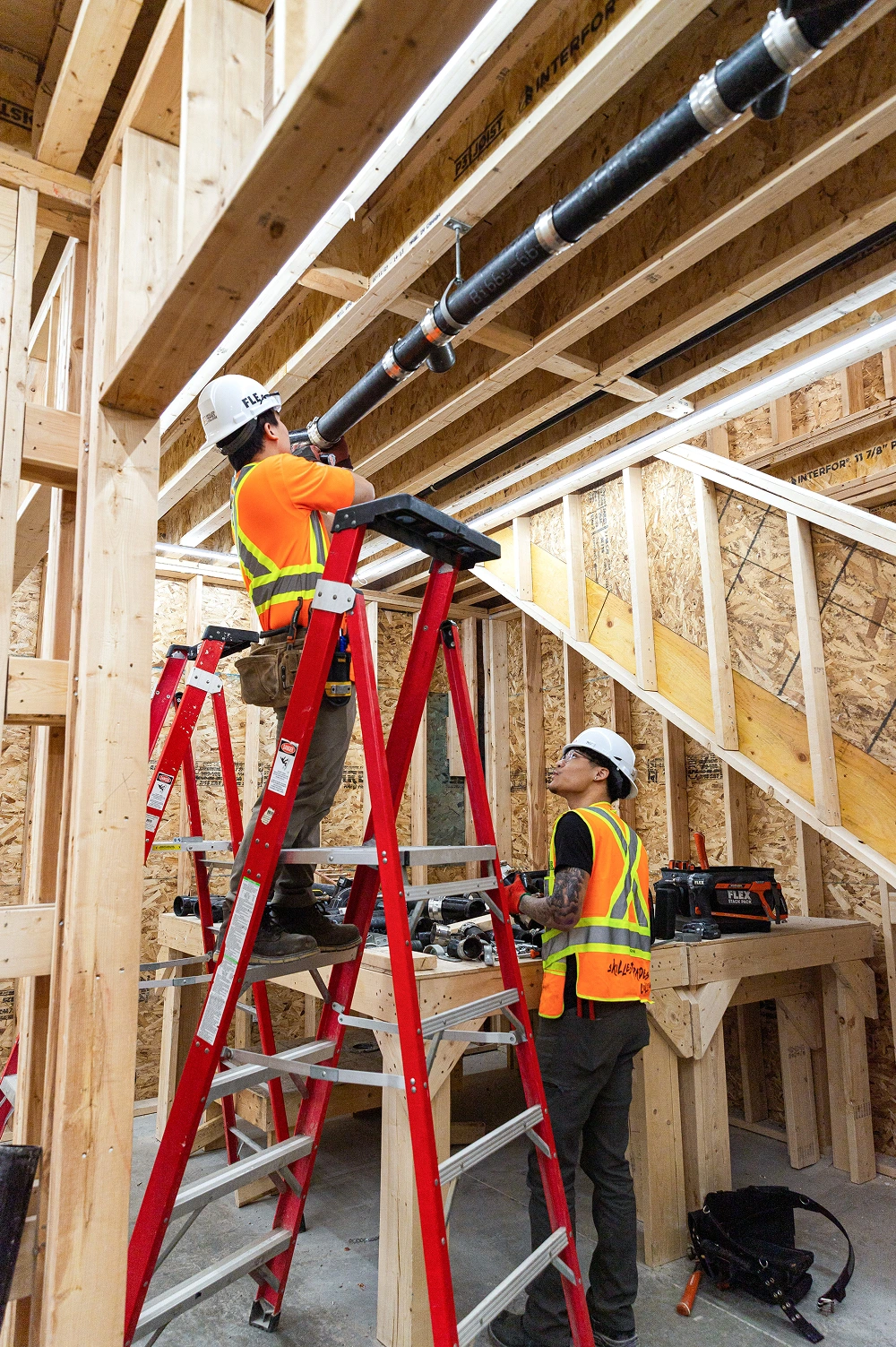12 Construction Certifications to Advance Your Career

Published On
02-02-2023

Electricians are an essential part of the skilled trades industry—without them, the modern world will grind to a halt. These tradespeople are responsible for the installation, maintenance, and repair of wiring systems in residences and buildings.
This year, there’s an expected 0.8% growth rate in the market size for skilled electricians in Canada. This means there will be plenty of jobs for people looking to start a career as a tradesperson.
Depending on their area of specialization, electricians have a wide range of responsibilities, training, and licensing. So, if you want to be a part of this booming industry, you need to narrow down your choices and see which field is right for you. Keep on reading to learn the different electrician specializations.
While there are several types of electricians, they fall under two primary categories: lineworkers and wireworkers.
If you see a person high up in the air working on a power cable, you’re most likely looking at a lineworker. These are tradespeople who work outdoors. Also referred to as linesmen, they are responsible for installing electric utility transmissions and distribution systems with higher voltages.
They may be tasked to work in power plants that generate electricity or under the ground in utility tunnels. These electricians are experts at maintaining high-voltage lines for residential, commercial, or industrial properties. Lineworkers may have unpredictable schedules since they must repair power lines damaged by severe weather.
These are electricians who work inside buildings. They install, maintain, and repair electrical systems, usually at lower voltages than those handled by lineworkers. Wireworkers, or wiremen, provide residential, commercial, or industrial buildings with a reliable source of electricity. They also ensure that appliances and fixtures are installed correctly and safely.

Within the two primary categories of electricians, you can choose from several specializations with corresponding certifications. It’s best to research each type thoroughly to determine which would suit your lifestyle. Here are your options:
These electricians work on automobiles by reviewing and installing all vehicle wiring systems. Some automotive electricians work on a vehicle’s lighting, fuel injection, anti-brake, or air conditioning systems. To qualify as one, you need to understand vehicle diagnostics first.
This type of electrician works in bigger buildings like schools, offices, hospitals and retail stores. As a commercial electrician, you’ll be expected to install, maintain, or repair electrical components and wiring systems. You must also ensure that they comply with the necessary safety precautions. To become one, you should complete your apprenticeship training in commercial setups.
Industrial electricians install and repair electrical systems in power plants, factories, or mines. These facilities usually include heavy machinery and high-voltage wiring. To get started, you need to undergo training as an apprentice under an experienced industrial electrician.
You can also specialize as an installation electrician, where you have the responsibility of setting up electrical equipment and machines. You can work anywhere, from residential to commercial settings and even in buildings under construction.
Maintenance electricians work in residential, commercial, and industrial settings. If this is the specialization you’re aiming for, you’ll be expected to check the safety of electrical systems and diagnose electrical problems. You need a license to work independently in this specialty.
As a residential electrician, you will be responsible for installing, troubleshooting, maintaining, or upgrading electrical systems in homes. To become one, you need formal classroom instruction and an apprenticeship under the supervision of a licensed electrician. You also have to pass provincial and/or territorial-level testing.
Given the shift to renewable sources of energy, solar panel electricians are in demand. While solar panels are reliable, they also need maintenance and repair. As an electrician in this field, you need to find the best places to assemble solar panels to ensure they are exposed to enough sunlight.

Wind turbine electricians assemble, maintain, repair, or replace the components of this clean energy source. This job is not for the faint of heart since it involves climbing hundreds of feet above the ground to install the necessary components.
Ontario has two main electrician licenses: A Construction and Maintenance (C&M) 309A license and an Industrial Electrician 442A license. While both have their advantages, C&M electricians can work across multiple industries including residential, commercial, and industrial.
Besides, electricians are also categorized by certification levels, which fall under
If you want to become an electrician, you must start as an apprentice. To become one, you need to have a high school diploma or its equivalent.
It’s recommended that aspiring electricians complete a pre-apprenticeship training program prior to the apprenticeship job search to put them in the best possible position to succeed in this career. Pre-apprenticeship training focuses on safety best practices, theory, prints, and installation methods in a hands-on environment.
Apprentices must then undergo hundreds of hours of classroom and on-the-job training. The hours will depend on the province or territory you want to work in, but expect to spend four years in training.
Afterward, you can apply for an apprenticeship under a licensed electrician.
In Canada, you can become a certified journeyman electrician after completing the four-year apprenticeship. You also need about 6,000 hours of technical training and a passing grade in all related exams.
A certified journeyman electrician is qualified to work on all types of electrical systems. They can work independently or be hired by a firm or organization.
As a Red Seal-certified electrician, you’ll be seen as a tradesperson who has demonstrated the necessary skills and knowledge required for your trade. This seal means you have attained the Canadian national standard for electricians. It also allows you to work anywhere in the country.
To get to this level, you need to complete the four-year apprenticeship program and the requirements to pass the journeyman electrician requirements. You must also pass the Red Seal Inter-Provincial (IP) Exam.
Now that you know the different types of electricians available, you’re sure to have a fulfilling, long-lasting, and financially stable career in the trades industry. We hope this article will help you choose the right electrician specialization!
Skilled Trades College is an industry-recognized institution that offers an electrician pre-apprenticeship program to help students get started in their prospective trades. This program provides valuable insight into becoming an electrician and prepares students for apprenticeships.
If you need more information or are interested in another trade, feel free to contact us.
9,281+
LIVES CHANGED

12,481+
WIRES PULLED

85,382+
2X4'S CUT

9,756+
PIPES LAYED

9,281+
LIVES CHANGED

12,481+
WIRES PULLED

85,382+
2X4'S CUT

9,756+
PIPES LAYED

9,281+
LIVES CHANGED

12,481+
WIRES PULLED

85,382+
2X4'S CUT

9,756+
PIPES LAYED
